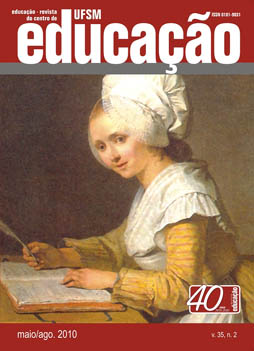School management: the pedagogical practice in the administrative policy of inclusive education
DOI:
https://doi.org/10.5902/198464442078Keywords:
Public education policy, School management, Ethnography.Abstract
The paper presents the results of a doctoral dissertation that covered the analysis of knowledge involving the everyday teaching and administrative practices of school managers who worked with the proposed construction of a citywide system of inclusive e ducation, while an educational policy. The aim was to follow the school management towards the proposed inclusive educationin three elementary schools in a medium-sized city in the state of São Paulo. The data were collected at the earlier school, a middle-aged one and another recently opened. The stages of the study were: 1) review of literature on: a) qualitative ethnographic research applied to education, b) principles of autonomy, planning, decentralization, c) the education of the school manager and d) relationship between school management and inclusive school; 2) data collection in schools, 3) description and categorization of data and 4) analysis and interpretation of results. To develop the methodology were used observations of the participants, semi-structured interviews, analysis of official documents of the school (internal and external). It was concluded that there is a lack of political-pedagogical project collectively built, a difficulty in developing coordinated actions aimed at the realitiy, problems in interpersonal relationships; a gap gulf between the proposed policy, the discourse about it and the daily practice. The school management is responsible for the construction of an inclusive school, but in the reality studied it was directed at administrative issues at the expense of the pedagogic ones.Downloads
How to Cite
Issue
Section
License
Declaration of originality
We declare that all articles present in the journal Educação (UFSM) are originals and were not submitted for publishing on any other publication, as a whole or a fraction. We also declare that, after being published by Educação (UFSM), a paper will not be submitted to another journal within two years. After this time, our journal transfers the publishing rights to the authors, with a permit granted by the Editorial Council.
We also acknowledge that the originals’ submission to Educação (UFSM) implies on a transference of copyright for physical and digital publishing to the journal. In case of noncompliance, the violator will receive sanctions and penalties predicted by the Brazilian Copyright Protection Law (n. 9610, dated 19/02/98).
Attribution 4.0 International (CC BY 4.0)
This license lets others remix, transform, and build upon the material for any purpose, even commercially, and copy and redistribute the material in any medium or format.

This work is licensed under a Creative Commons Attribution 4.0 International (CC BY 4.0)






